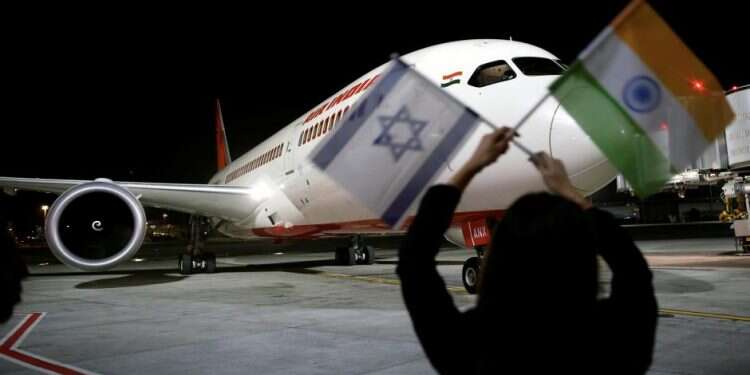Saudi Arabia opened its airspace for the first time to a commercial flight to Israel with the inauguration on Thursday of an Air India route between New Delhi and Tel Aviv.
Air India 139 landed at Tel Aviv's Ben-Gurion International Airport at 10:15 p.m. after a flight of over 7½ hours, marking a diplomatic shift for Riyadh that Israel says was fueled by shared concern over Iranian influence in the region.
"This is a really historic day that follows two years of very, very intensive work," Tourism Minister Yariv Levin said in a radio interview, adding that using Saudi airspace cut travel time to India by around two hours and would reduce ticket prices.
Saudi Arabia does not officially recognize Israel.
Riyadh has also not formally confirmed granting Air India overflight rights. While the move ended a 70-year-old ban on planes flying to or from Israel through Saudi airspace, there is as yet no indication that it will be applied to any Israeli airline.
The Air India Boeing 787-8 Dreamliner entered Saudi airspace and flew over the kingdom at 40,000 feet for about three hours, coming within 60 kilometers (37 miles) of the capital Riyadh, according to the Flightradar monitoring app. It then crossed over Jordan into Israel.
The airliner had earlier flown over Oman, according to Flightradar. Officials from Oman, which also does not recognize Israel, could not be reached for comment.
A festive ceremony, including the lighting of a menorah and incense candles, was held prior to the plane's takeoff from New Delhi. Along with Levin, the flight was greeted at Ben-Gurion airport by Transportation Minister Yisrael Katz and Tourism Ministry Director General Amir Halevi.
"Tonight we celebrate the strengthening of our relationship with India and the first civilian association with Saudi Arabia and Gulf states," Katz said.
"When we signed the open skies agreement with European Union countries, we didn't dare dream about opening the skies above Saudi Arabia as well. And yet tonight we mark a historic Air India flight, which comes to us for the first time since the state's inception via a route over Saudi Arabia," Katz added.
The Tourism Ministry will grant Air India a one-time grant of $750,000 for the purpose of marketing the new line to Israel.
"The new line will contribute to increasing tourist traffic from India, which is in the midst of a significant upswing," Levin said.
Israel's flag carrier El Al, excluded from the Saudi route, says its Indian competitor now has an unfair advantage.
El Al currently flies four times a week to the Indian city of Mumbai. Those flights take nearly eight hours, following a Red Sea route that swings toward Ethiopia to avoid Saudi airspace.
If El Al planes were to fly on to New Delhi, a destination El Al has said it might be interested in, they would require another two hours – and significantly more fuel.
The cost of a one-way ticket for the history-making Air India flight was $331 and a return ticket cost $309.
Interviewed on Army Radio, Levin voiced confidence that El Al would eventually be allowed to use Saudi airspace.
"You know, they said the Saudis wouldn't let any flight pass. So here, the Saudis are permitting it. It is a process, I think. Ultimately [El Al flights] will happen, too," he said.
Asked if any other foreign airlines might follow Air India by opening routes to Tel Aviv over Saudi Arabia, Levin said he has been in negotiations with Singapore Airlines and a carrier from the Philippines, which he did not name.
"They are certainly showing readiness and desire to fly to Israel, and I don't know if they will also receive permission like the Indian airline," he said.




